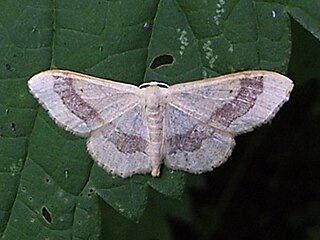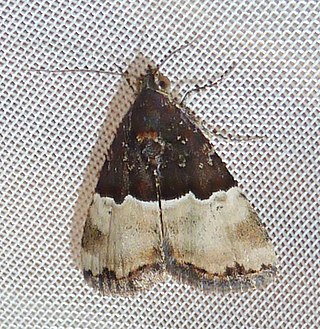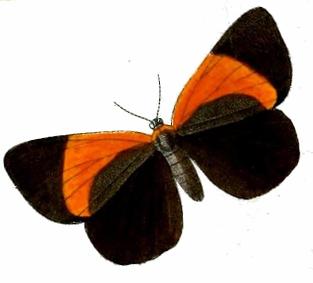
Idaea, sometimes called Hyriogona, is a large genus of geometer moths. It was erected by Georg Friedrich Treitschke in 1825. They are found nearly worldwide, with many native to the Mediterranean, the African savannas, and the deserts of western Asia.

Eublemma is a genus of moths of the family Erebidae described by Jacob Hübner in 1829.

Ozarba is a genus of moths of the family Noctuidae. The genus was erected by Francis Walker in 1865.

Pericyma is a genus of moths in the family Erebidae. The genus was erected by Gottlieb August Wilhelm Herrich-Schäffer in 1851.

Pseudozarba is a genus of moths in the subfamily Eustrotiinae of the family Noctuidae. The genus was described by Warren in 1913.

Cyclophora is a genus of moths in the family Geometridae. Many species are referred to as mochas in reference to their colouration, primarily in Europe.
Erastria is a genus of moths in the family Geometridae, found primarily in tropical and subtropical climates in Africa and Asia. The genus was erected by Jacob Hübner in 1813.

Mesothea is a monotypic moth genus in the family Geometridae described by Warren in 1901. Its only species, Mesothea incertata, the day emerald or plain emerald, was first described by Walker in 1863. It is found in North America.

Scopula is a genus of moths in the family Geometridae described by Franz von Paula Schrank in 1802.

Sterrhinae is a large subfamily of geometer moths with some 3,000 described species, with more than half belonging to the taxonomically difficult, very diverse genera, Idaea and Scopula. This subfamily was described by Edward Meyrick in 1892. They are the most diverse in the tropics with the number of species decreasing with increasing latitude and elevation.

Eupitheciini is a tribe of geometer moths under subfamily Larentiinae, often referred to as pugs. The tribe was described by Tutt in 1896.

Chiasmia separata is a moth in the family Geometridae first described by Herbert Druce in 1882. It is found on Saint Helena and has also been recorded from South Africa, Angola, Cameroon, Ivory Coast, Kenya, Madagascar, Mozambique, Nigeria, Rwanda, Tanzania and Uganda.

Bostra is a genus of snout moths. It was described by Francis Walker in 1863 and is known from Europe, Africa, and Asia.
Scopula agrapta is a moth of the family Geometridae. It was described by Warren in 1902. It is found in Kenya, South Africa, Tanzania and Uganda.
Scopula dissonans is a moth of the family Geometridae. It was described by William Warren in 1897. It is found in the Democratic Republic of the Congo, Ethiopia, Kenya, Nigeria, South Africa, Tanzania and Uganda.

Scopula quadrifasciata is a moth of the family Geometridae. It is found in Angola, Kenya, Nigeria, South Africa, Tanzania, Uganda, Zambia and Zimbabwe.
Mesocolpia consobrina is a moth in the family Geometridae first described by William Warren in 1901. It is found on São Tomé Island, Angola, DR Congo, Kenya, Nigeria, Sierra Leone and South Africa.
Asthenotricha inutilis is a moth in the family Geometridae first described by William Warren in 1901. It is found in Cameroon, the Democratic Republic of the Congo, Kenya, South Africa, Tanzania and Uganda.
Mixocera parvulata is a moth of the family Geometridae first described by Francis Walker in 1863. It is found in India, Sri Lanka, Maldives, Vietnam, Ethiopia, Kenya, Madagascar, South Africa, Tanzania and Zimbabwe
Gnophini is a tribe of moths.










